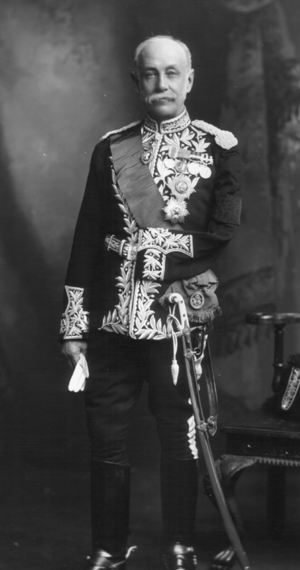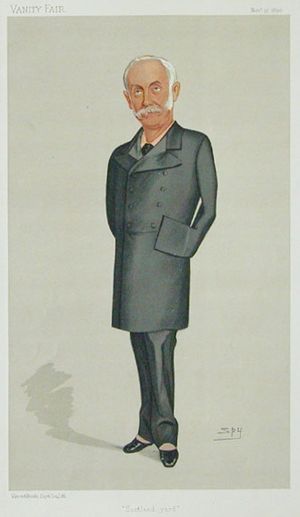Sir Edward Bradford, 1st Baronet facts for kids
Quick facts for kids
Sir Edward Bradford
|
|
|---|---|

Sir Edward Bradford, 1901
|
|
| Commissioner of Police of the Metropolis | |
| In office June 1890 – 4 March 1903 |
|
| Personal details | |
| Born |
Edward Ridley Colborne Bradford
27 July 1836 Buckinghamshire, England |
| Died | 13 May 1911 (aged 74) |
| Occupation | Indian Army officer |
Colonel Sir Edward Ridley Colborne Bradford, 1st Baronet (born July 27, 1836 – died May 13, 1911) was an officer in the British Indian Army. He later became the head of the London Metropolitan Police, known as the Commissioner of Police of the Metropolis. He held this important role from 1890 to 1903.
Contents
Edward Bradford's Early Life and Military Career
Edward Bradford was born in Buckinghamshire, England. He went to Marlborough College starting in 1846. In 1853, he joined the British East India Company's army as an officer. He became a lieutenant in 1855.
He served in a war in Iran from 1856 to 1857. He also fought in the later parts of the Indian Mutiny. This was a major uprising against British rule in India. He showed great bravery in many battles.
In September 1860, Edward's health was not good. He had been fighting for a long time. He was sent back to England to get better.
A Brave Officer's Injury
Edward returned to India in 1862. He was given a political role in West Malwa. On May 10, 1863, something dramatic happened. He was hunting near Guna when a tigress attacked him. He lost his left arm in this attack.
Even after losing his arm, he continued to ride horses. He would hold the reins with his teeth! This injury meant he could no longer serve in active military battles.
Edward Bradford's Work in India
Even though he couldn't fight, Edward stayed in the Indian Army. He worked as a "Political Agent." This meant he was like a diplomat or representative for the British government. He worked in different areas like Jaipur and Bharatpur.
He was promoted to captain in 1865. In 1873, he became a major. In 1866, he married Elizabeth Adela Knight.
In 1874, he took charge of the Thuggee and Dacoity Department. This group was like a secret police force for the Viceroy of India. The Viceroy was the highest British official in India.
In 1878, he became the governor-general's agent for Rajputana. He was in charge of dealing with the local Indian rulers, called Rajput princes. These princes respected him, especially because he had survived the tiger attack. He was promoted to lieutenant-colonel in 1879 and colonel in 1884. For his good work, he was knighted in 1885. This meant he was given the title "Sir."
In 1887, he went back to London. He worked for the India Office. The next year, he returned to India to guide Prince Albert Victor, Duke of Clarence on a tour. He came back to England in 1889. He was offered a job as governor of Cape Colony (in South Africa), but he said no.
Leading the London Police Force

Bradford as caricatured by Spy (Leslie Ward) in Vanity Fair, November 1890
In June 1890, Sir Edward Bradford was chosen to be the new Commissioner of Police of the Metropolis. This meant he was the chief of the London police force, also known as the Metropolitan Police.
His main goal was to make the police force stable again. There had been some riots and changes in leadership. Sir Edward was a great choice for this job. His military background helped him lead. His time in India taught him about managing people and solving crimes.
During his time as Commissioner, London was mostly peaceful. The public's opinion of the police got much better. In 1899, crime in London reached its lowest point ever recorded.
Improving the Police Force
Sir Edward quickly solved a police strike in 1890. He also stopped the London County Council from trying to take control of the police.
He visited every single police station in London. He talked and listened to his police officers. He was the first Commissioner to do this. He changed how police officers patrolled to make their work less boring. He also tried to improve the education of new police recruits.
He built more police stations and made the living areas for officers better. He made sure all stations could send messages using telegraph. He also encouraged officers to play sports. He even brought in a lighter uniform for summer.
Sir Edward received many honors while he was Commissioner. He was made a Knight Commander of the Bath in 1890. In 1897, he became a Knight Grand Cross of the Bath. He also received the Knight Grand Cross of the Royal Victorian Order in 1902. He was the first Commissioner to be given the title of Baronet. This is a special honor that makes his title hereditary. He retired on March 4, 1903.
Later Years and Family
After he retired, Sir Edward Bradford spent a lot of time fox hunting. He loved this activity and did it several times a week. He also helped lead a committee that looked into the wages of postal workers. He served as an assistant to both King Edward VII and King George V.
Sir Edward passed away suddenly at his home in Westminster. He was buried in Chawton, Hampshire, next to his first wife, Elizabeth Adela Knight, who had died in 1896. He had married his second wife, Edith Mary Nicholson, in 1898.
From his first marriage, he had a daughter and five sons. Sadly, his oldest son, Montagu Edward Bradford, died in India from cholera. His second son, Sir Evelyn Ridley Bradford, became a lieutenant-colonel and was killed in action in France in 1914 during a war. Two other sons also died young in India. His daughter, Beryl Adela, never married. His fifth son, Edward Austen Bradford, also served in the military.
Images for kids


